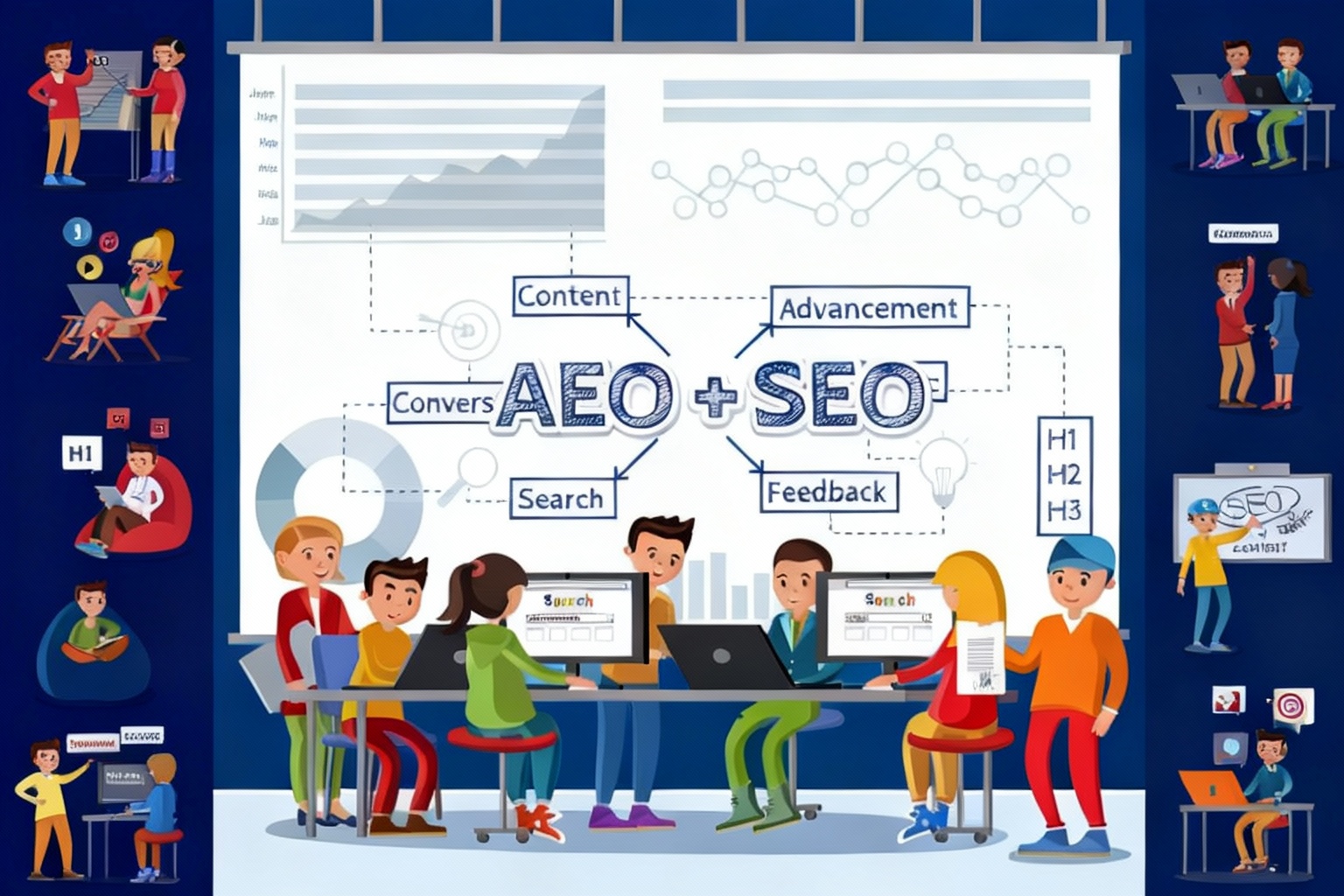Embarking on the journey of search engine optimization opens doors to a realm filled with endless possibilities. Understanding how search engines work and the strategies they use can significantly impact your online presence. By delving into the intricacies of search engine positioning, you equip yourself with the knowledge to navigate the digital landscape successfully. Unraveling the complexities of algorithms and search results propels businesses towards the coveted first page of search engine rankings. It's not just about visibility; it's about driving organic traffic, enhancing user experience, and achieving higher rankings through best practices tailored to your target audience. As we delve deeper into the world of search engine positioning, the benefits and strategies will unfold, leading to a comprehensive grasp of its pivotal role in the digital marketing sphere.
Understanding Search Engine Positioning
Delving into the dynamics of how search engines work, understanding search engine positioning involves grasping the intricacies of how websites rank in search results. From search algorithms to user behavior, it's about comprehending why certain pages appear higher than others. Analyzing metrics like average position and organic traffic sheds light on the effectiveness of SEO strategies. Incorporating quality content, relevant keywords, and user-friendly experiences are key elements for enhancing search engine rankings. By focusing on search intent, proper keyword research, and technical SEO aspects, websites can aim for higher visibility in search results. Aligning with best practices and adapting to ever-changing algorithms creates a solid foundation for achieving optimal search engine placement.
Defining Search Engine Positioning
Understanding search engine positioning involves the strategic placement of a website within search engine results to enhance visibility and attract organic traffic. It focuses on improving rankings on search engine results pages through effective keyword research, quality content creation, and optimization techniques. An essential aspect is utilizing search engine algorithms to achieve higher rankings for targeted keywords, ultimately driving more traffic to specific web pages. By understanding the nuances of search engine results and user search intent, businesses can tailor their content to meet the needs of their target audience and improve overall search engine placement. Incorporating best practices like optimizing meta tags, enhancing page speed, and providing relevant information can significantly impact search engine rankings and boost online visibility.
Importance of Search Engine Positioning
Achieving a prominent position in search results is vital for digital visibility. Enhancing search engine positioning can lead to increased organic traffic and better user engagement. By focusing on the right keywords and optimizing content, websites aim to secure higher rankings. Implementing best practices like quality content, relevant keywords, and user-centered strategies can improve search engine placements. Regular monitoring with tools like Google Search Console ensures continuous optimization for better performance. Elevating search engine rankings not only boosts visibility but also drives targeted traffic to specific pages, maximizing the benefits of search engine positioning.
Benefits for Businesses
Constructive SEP practices underpin several benefits for organizations striving to fortify their digital presence:
- Better Brand Visibility: Improved positioning enhances your brand’s online visibility. As your webpages rank higher on SERPs, they attract more clicks, escalating brand exposure exponentially.
- Increased Organic Traffic: A higher ranking correlates directly to higher organic traffic, which is a sustainable, cost-effective way of attracting potential customers.
- Outranking Competitors: SEP enables your webpages to outrank competitors, giving you a competitive edge. Traffic intended for competitors instead ends up on your site, expanding potential lead generation.
- Augmented Brand Recognition: When integrated with stellar content, SEP increases the visibility of your brand for relevant search queries. Consequently, this exposes your brand's name and information to users repetitively, bolstering brand recall and recognition.
- Maximized ROI: SEP aids in creating detailed, high-quality content that conveys professionalism and knowledge. This seals consumer trust, thereby maximising conversion rates and return on investment (ROI).
SEP creates a holistic digital ecosystem where visibility and business growth interact seamlessly.
Increased Organic Traffic
High-ranking webpages garner the majority of clicks from search engine users. SEP tactics finesse your pages’ visibility, inviting an influx of organic traffic. Unveiling your target audience's perceived needs and using strategically picked keywords, you prepare content that addresses those needs while aligning with their search intents. When search engines deem your site valuable for those keywords, you gain improved SERP rankings.
Organic listings are perceived as inherently trustworthy, as they are not influenced by advertising dollars. Thus, more organic traffic equates to a higher probability of conversions. With time, well-sited pages latch onto user attention, inducing repeat traffic, cementing customer loyalty. The culmination of SEP—focused on improved keyword rankings—is a flourishing stream of organic traffic that, over time, can spiral into substantial business growth.
Outranking Competitors
Living digitally implies competing in a perpetually expanding, aggressive landscape. Brands with similar offerings vie for the same target audience's attention, and only pinnacle ranking pages nullify this competition. SEP arms your webpages with the potential to outstrip competitors.
Ensuing top search engine positions implies that instead of a searcher seeing your competitors' website, they see yours. This likelihood of such searchers clicking on your link first enhances manifold. Moreover, you can study competitor keywords and strategies to innovate and adopt better practices in your SEO.
SEP guides your webpage to secure the highly sought-after real estate on SERPs, ensuring you stay ahead in the digital race, even as competitors jostle for visibility.
Enhanced Brand Visibility
SEP efforts enhance the visibility of your webpages, causing a ripple effect on brand visibility. High-ranking pages equate to your brand being more noticeable, avowing its digital credibility. When your pages rank higher for significant keywords and appear on SERPs regularly, your brand emerges as a recognizable entity.
Searchers perceive brands that regularly appear in high-ranking results as trustworthy and authoritative sources. Therefore, even if users don't click on your result, repeated exposure to your brand's name, delivered via high-ranking pages, reinforces brand recognition. They may not need your products or services at that particular moment, but when they do, they're likely to remember your brand and lean towards choosing you over competitors. SEP strategically engineer such results, supercharging your brand's visibility.
Search Engine Positioning vs SEO: A Comparative Analysis
When considering search engine positioning and SEO, it's essential to understand the distinct approaches each takes towards improving visibility. While search engine positioning focuses on the actual rank of a website in search results, SEO encompasses a broader set of tactics to enhance online presence and drive organic traffic. Search engine positioning deals specifically with the placement of a website in search engine results, emphasizing the importance of achieving a high average position. On the other hand, SEO involves a comprehensive strategy that includes keyword research, user experience optimization, and content creation with relevant keywords. Both search engine positioning and SEO aim to secure higher rankings and attract the target audience by utilizing best practices such as optimizing title tags, meta descriptions, and internal linking for improved search engine placement.
Main Focus
Thus, while SEO and SEP stem from the same root, they branch out differently, dictating diverse methods for higher search result rankings.
Timeline
SEO is a long-term game plan. It stretches across several months, even years, to ameliorate a website's cumulative ranking, visibility, and overall quality. An effective SEO strategy takes a while to yield results primarily because it involves a multitude of changes—on-page optimization, off-page strategies, link building, content creating, and more—that reshape the website's core fabric.
On the other hand, SEP, though continuous, focuses on improving specific pages' rankings. The effect of minute tweaks or drastic overhauls can be perceptible within weeks, if not days, based on Google's indexing. A detailed SEP plan might profile faster results than a broader SEO strategy, courtesy of its focused approach.
However, the long and short of it is that whether SEO or SEP, any significant change in search engine rankings doesn't occur overnight. Tenacity, patience, and continuous optimization are immanent in both spectrums.
Strategies to Improve Search Engine Positioning
Improving your search engine positioning requires a dedicated strategy. It transcends regular keyword research to delve into creating supreme quality content, optimizing on-page SEO, perfecting internal linking, and updating existing content. By integrating these elements into a sturdy SEP strategy, you chart a trajectory for advancing your specific webpages' ranking in SERPs. Now let's examine these strategies in-depth to unfurl the potential they hold and gauge how they can spearhead your search engine positioning.
Targeting the Right Keywords
Keywords—the cornerstone of any SEO strategy—influence SEP significantly. Unlike general SEO where you're targeting keywords sitewide, SEP demands you target precise keywords for specific pages. Begin by conducting an exhaustive keyword research for your target page. It's not prudent to go after the highest volume or the most popular keywords every time. Rather, sift through relevant keywords that align with the context of your page and hold significant promise to drive traffic.
The amalgamation of long-tail keywords with exact match phrases uplifts your page’s relevance for a wider set of search queries. Once you've zeroed in on your target keywords, incorporate them judiciously within your content—title, meta descriptions, headers, content body, and ALT text. Remember, keyword stuffing can backfire, inviting Google penalties and dampening user experience.
Fortuitously, SEOptimer’s keyword research tool comes in handy to undertake a comprehensive keyword analysis, identifying high-value, low-competition keywords to optimize your page. This strategic targeting of the right keywords can augment your search engine positioning, escalating the visibility and performance of individual pages.
Creating High-Quality Content
Quality content is king in SEP. It acts as the driving force beckoning a higher rank on search engines. The quality of content remains a decisive factor influencing whether your page garners a top position or wallows at the bottom. Creating engaging, relevant, and value-laden content is non-negotiable.
Admittedly, the stakes are higher in SEP. Here, you are not just creating fresh content but upgrading existing ones for better ranks as well. Thus, your focus should be on curating content that's:
- Informative and unique, offering solutions or insights that others don't.
- Comprehensive, covering all aspects of the topic.
- Well-formatted and easily readable, incorporating headings, subheadings, bullet points, images, and so on.
- Built around keyword usage, keeping spamming at bay.
Committing to quality content creation ensures that your webpage stands out as a reliable source of information. It fortifies user trust and prompts wider sharing, generating quality backlinks that bolster your search engine positioning.
Optimizing On-Page SEO
On-page SEO optimization plays a pivotal role in SEP, enhancing your page's visibility and readability. By paying attention to elements like meta tags, header tags, URL structure, and ALT text, you can optimize each component for better search engine positioning. Here's what you need to focus on:
- Meta Tags: It’s crucial to include your target keywords in your title tag and meta descriptions. These are the first things a user sees on SERPs, and well-crafted meta tags can enhance your CTR.
- Header Tags: Use H1, H2, and H3 tags to structure your content. Include your target keywords in these tags, enhancing readability and SEO.
- URL structure: Make your URLs descriptive and concise, including target keywords. A properly structured URL helps both users and search engines understand what the page is about.
- Alt Tags: Search engines cannot read images, but they can read ALT text. Including descriptive ALT text for your images with target keywords can contribute to better search engine positioning.
Optimization, when done right, ticks off Google's relevancy and usefulness parameters, ensuring your pages position higher in search results.
Internal Linking
Crafting high-quality content is essential, but you need to steer your audience through this valuable content. This is where internal linking steps in, guiding users from one relevant page to another.
Internal links could direct users from your blog post about 'the benefits of eating organic' to your eCommerce page, where you sell organic products. Such strategy not only retains the user on your website longer but also subtly guides them down the purchase funnel.
Interior linking also circulates link equity across your website. Hence, high authority pages should ideally have links to other important, lesser-known pages on your site. Remember to use keyword-optimized anchor texts, as they indicate to search engine bots the relevance and context of the linked page.
Remember, indiscriminate internal linking may confuse search engines and dilute link value, making your SEP attempts counterproductive. Therefore, ensure that your internal links are strategically distributed and relevance-centric.
Updating Existing Content
One of the bedrock principles of SEP is updating existing content. Revamping and refining your older blogs or web pages can dramatically boost their performance on SERPs. Updated content signals Google bots that your website is active, relevant, and up-to-date. By filling any topical gaps in your content, increasing its depth, and including recent data or examples, you can make your content more informative and comprehensive.
Updating existing content also lets you include trending keywords or phrases, giving your content a boost in topical relevancy. A word of caution here - updates must be significant, not merely changing a few words or adding an insignificant paragraph.
Remember, Google already recognizes your page as a relevant result for certain keywords. Tweaking and updating it can seek better connectivity with users, signal 'freshness' to Google algorithms, enhance on-page SEO, and navigate your page into higher search rankings.
Measuring Search Engine Positioning
Just like all digital marketing tactics, it's crucial to measure the results of your search engine positioning efforts. SEO tools and Google Search Console can provide valuable insights into your keyword rankings and the performance of individual pages. These metrics enable you to determine which strategies are working and guide future optimizations.
Using SEO Tools
SEO tools are your ally in measuring your search engine positioning. They help track your keyword performance, generate keyword ideas, analyze backlinks, and even provide you with actionable recommendations for improvement. Tools like SEOptimer provide you with an integrated SEO platform that allows you to do keyword research, monitor social media, perform a comprehensive website audit, and even create white-label reports.
SEOptimer’s keyword tracking tool monitors your keyword rankings over time. It shows you the keywords that you’re currently ranking for, enabling optimal monitoring of your SEP efforts. Such data insights guide strategic decision-making and on-the-fly tweaking, keeping your pages in sync with user expectations and Google ranking factors.
Google Search Console
Complementing SEO tools is Google Search Console (GSC), an indispensable resource to monitor your site's performance. GSC provides data on your website's search traffic, impressions, clicks, and position on SERPs. It can track the average position of your pages over time, providing insights into your overall SEO performance.
One of the most useful features of GSC is its ability to show queries that lead users to your website. You can view which keywords are driving traffic to your site and their respective positions, impressions, clicks, and CTR. By analyzing this data, you can identify successful keywords and weed out underperforming ones.
Additionally, the 'Position' tab in GSC gives an average ranking position for each search query, providing insights into your SEP performance. These metrics act as indicators of your ongoing SEO efforts, guiding future strategies to strengthen your search engine positioning.
Conclusion
In an age where visibility is power, mastering the art of Search Engine Positioning can forge a route towards improved digital impact. From enriching brand visibility and outranking competitors to propelling organic traffic, SEP unlocks numerous benefits for businesses. While the practice hinges on SEO principles, it focuses profoundly on ameliorating specific pages’ rank on SERPs, lending the approach its distinctive edge.
The road to stellar SEP involves a blend of strategic elements—targeting the right keywords, creating high-quality content, optimizing on-page SEO, perfecting internal linking, and regularly updating existing content. By wiring these ingredients into a sturdy SEP framework, you can amplify your individual pages' visibility. However, patience is essential, as visible changes require time to manifest.
Remember, just like SEO, SEP isn't static. It's an evolving strategy, fine-tuned as per evolving search algorithms, changing user behavior, and fluctuating competitor strategies. With regular monitoring and intelligent tweaking, SEP can pave a trajectory toward perpetual online growth and widened visibility.
Frequently Asked Questions
What is the importance of Search Engine Positioning in online marketing?
In online marketing, Search Engine Positioning is pivotal as it boosts a webpage's visibility on SERPs, leading to increased organic traffic. It helps accentuate brand exposure, generates leads, and influences conversion rates. SEP propels business growth by improving the performance of specific pages in online search results.
How does Search Engine Positioning differ from SEO?
While both are intertwined, SEO focuses on improvising the entire website’s visibility, whereas SEP zeroes in on enhancing rankings for specific pages. SEO employs broader strategies like backlinking and keyword optimization across the site, whereas SEP fine-tunes select webpages for improved search engine results.

















.webp)


